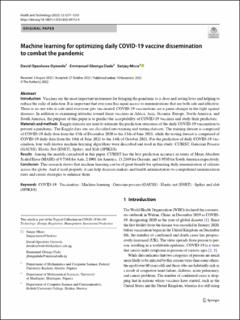Machine learning for optimizing daily COVID-19 vaccine dissemination to combat the pandemic
Peer reviewed, Journal article
Published version
Permanent lenke
https://hdl.handle.net/11250/3036293Utgivelsesdato
2022Metadata
Vis full innførselSamlinger
Sammendrag
Introduction Vaccines are the most important instrument for bringing the pandemic to a close and saving lives and helping to reduce the risks of infection. It is important that everyone has equal access to immunizations that are both safe and effective. There is no one who is safe until everyone gets vaccinated. COVID-19 vaccinations are a game-changer in the fight against diseases. In addition to examining attitudes toward these vaccines in Africa, Asia, Oceania, Europe, North America, and South America, the purpose of this paper is to predict the acceptability of COVID-19 vaccines and study their predictors. Materials and methods Kaggle datasets are used to estimate the prediction outcomes of the daily COVID-19 vaccination to prevent a pandemic. The Kaggle data sets are classified into training and testing datasets. The training dataset is comprised of COVID-19 daily data from the 13th of December 2020 to the 13th of June 2021, while the testing dataset is comprised of COVID-19 daily data from the 14th of June 2021 to the 14th of October 2021. For the prediction of daily COVID-19 vaccination, four well-known machine learning algorithms were described and used in this study: CUBIST, Gaussian Process (GAUSS), Elastic Net (ENET), Spikes, and Slab (SPIKES). Results Among the models considered in this paper, CUBIST has the best prediction accuracy in terms of Mean Absolute Scaled Error (MASE) of 9.7368 for Asia, 2.8901 for America, 13.2169 for Oceania, and 3.9510 for South America respectively. Conclusion This research shows that machine learning can be of great benefit for optimizing daily immunization of citizens across the globe. And if used properly, it can help decision makers and health administrators to comprehend immunization rates and create strategies to enhance them.

